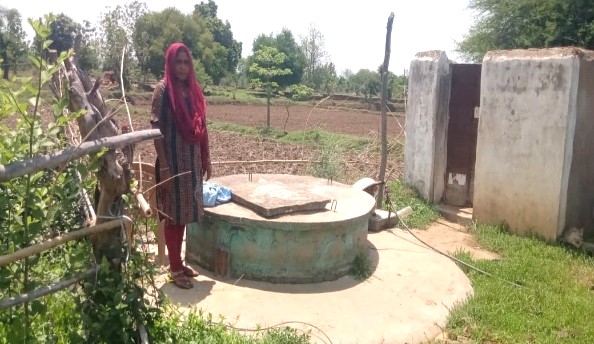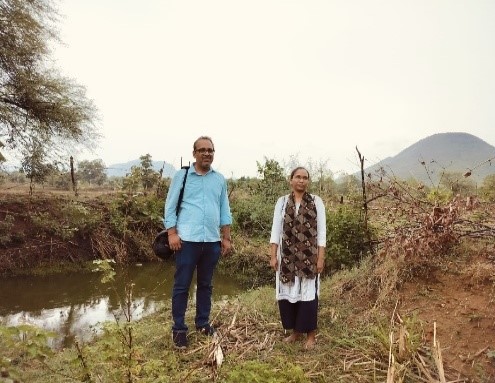Village- Nuapada, GP- Nuapada, Block- Sinapali, Dist- Nuapada
Shantilata Jagat, a 45-year-old wife of Dashrath Jagat, who is 50 years old, resides in the Nuapada village in the Nuapada gram panchayat of the Sinapali block. They have 1 daughter and 3 sons.
During the project inception period, the field facilitator, Mr. Barun Sunani of Chale Chalo, identified Shantilata Jagat as one of the members of the Nuapada village Didi group. Due to her active participation in discussions and meetings, she took on a lead role and became the president of the group. She got involved in regular awareness, sensitization, mobilization, and planning activities in the village. With the support of the Chale Chalo team, she also facilitates the Didi group meetings in the village.
In 2021, she got the opportunity to attend the exposure visit to Kawardha in the Kabirdham district of Chhattisgarh with other 15 Didi members from different project villages. The visit was facilitated by a local-based NGO named Samarth Foundation to explore water resources, farming lands, rainwater harvesting structures, plantation sites, and orientation on the importance of water, water conservation, and measures for increasing soil fertility.

After their return to home, the Nuapada Didi group discussed their experience of the exposure and decided to initiate a rooftop water harvesting model. On 10.2.2021, along with some Didi leaders and Barun Sunani, Mrs. Jagat visited to Nuapada gram panchayat office and met with Sarpanch, Mr. Bidyadhar Badkia and Gram Rozgar Sevak, Mr. Prakash Dandasena to discuss the possibilities of adopting rooftop rainwater harvesting model to conserve rainwater to address the water crisis in their area. Both the Sarpanch and GRS agreed to the idea and planned to start a sample rooftop rainwater harvesting system at the GP office.
The panchayat officials and Didi group members visited the Junior Engineer to seek technical support and guidance for planning and constructing the rooftop rainwater harvesting structure. Finally, the construction began on 25.09.2021 and was completed by 23.10.2021.
The success inspired Shantilata to address water issues at her household level. She planned to construct a dug well at her home under the micro water security at the household development plan, and with Mr. Sunani’s support, she applied in Palli Sabha. After receiving approval from Palli Sabha, the Jagat family constructed a dug well on their land and started growing a variety of fruits and vegetables near the well.

The availability of water in the well also motivated the Jagat family to start a brick-manufacturing business, which will help the family in economic growth. With the profits from the brick business, they renovated their house with self-labor and hired people to work in brick manufacturing. They also used the profits to buy a tractor for agricultural and brick-transporting purposes. Within 1.5 years, due to growth in the family’s economy, they planned to construct a farm pond and start pisciculture. During the assessment for the micro water security plan at the farm level, she proposed for the farm pond and received approval for its construction in Palli Sabha.
Currently, the farm pond contains 4-5 feet of water, and they have started pisciculture which they use for their own as well as sell in the market. Now the couple plans to start poultry and duck rearing with the expansion of the farm pond. In addition to that, they have also received mini milling machines from the agriculture department for rice, wheat flour, pulses, and oil processing.
During the recent visit of the Chale Chalo team and the evaluator, she shared how the knowledge gained from the exposure visit, Didi group meetings, workshops/ training, and the micro water security planning process had helped her to plan for water conservation measures and initiate different business ideas.
The growth of Shantilata Jagat in terms of knowledge, planning, and implementation has inspired other Didi members, Jala Mitras, and other community members to address their water issues, by using the micro water security plans (HDPs, FLPs and VDPs) leading to food and income security.
